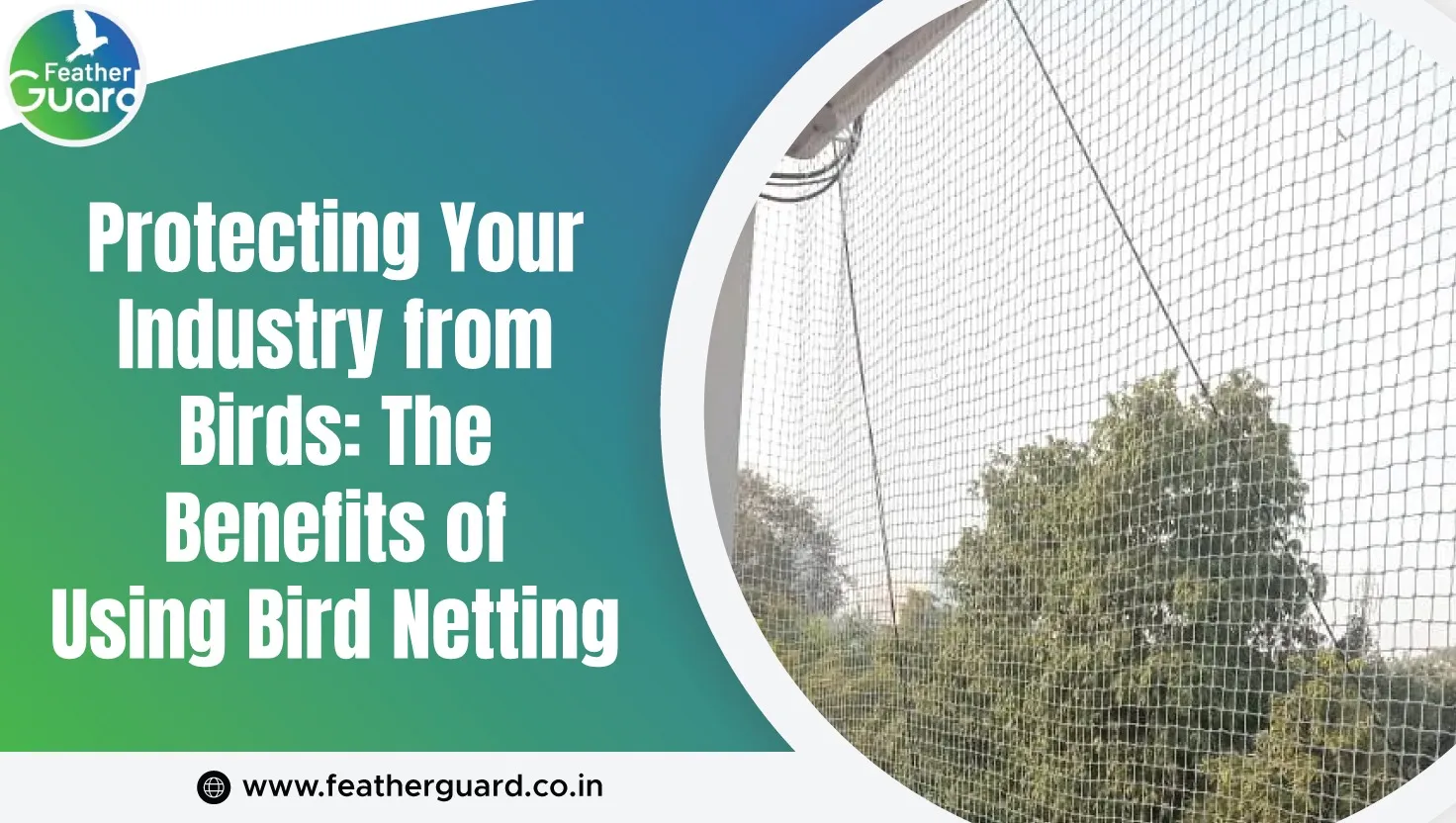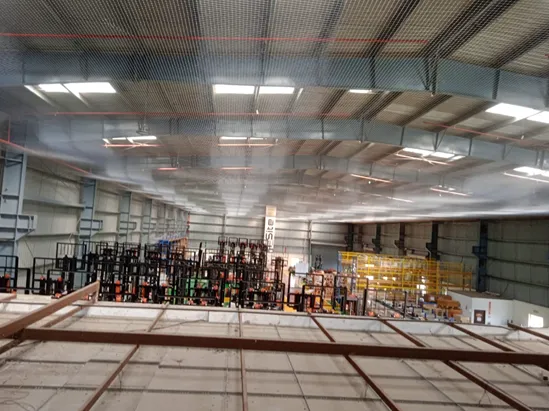
Birds may seem harmless in parks and gardens, but when they invade industrial areas, they become a serious problem. In many industries across India, birds like pigeons, sparrows, and crows are more than just a nuisance. They can damage property, pose health risks, and even disrupt operations. For businesses looking to maintain clean, safe, and efficient work environments, bird netting offers a reliable and long-term solution.
The Dangers of Birds in Your Industry
Birds in industrial spaces can lead to serious problems if not controlled in time. Their droppings can damage machinery, stain surfaces, and corrode metal parts. Nesting materials can clog vents, drainage systems, and even cause fire hazards. Bird presence also creates health risks, spreading diseases through droppings and feathers. In workplaces, this leads to safety concerns and reduced employee productivity. Uncontrolled bird activity can result in expensive repairs, maintenance costs, and operational delays. That’s why timely action with effective bird control measures like netting is essential for protecting your industry from birds from damage and disruption.
Damage to Property
Bird infestations in industrial settings can lead to serious structural and equipment damage. Birds often nest in roofs, beams, and open factory areas, leaving behind droppings that corrode machinery, stain walls, and degrade electrical components. Additionally, nesting materials can clog drainage and ventilation systems, contaminate raw materials, and damage packaging — all of which lead to costly repairs and operational delays.
Health and Safety Risks
Bird droppings aren't just unsightly; they pose a real health hazard. These droppings may carry harmful bacteria, fungi, and parasites responsible for diseases like salmonella, histoplasmosis, and cryptococcosis. Accumulated droppings also create slippery surfaces, increasing the risk of accidents in the workplace. Preventing bird access is essential for maintaining a safe and hygienic environment for workers.
Impact on Productivity
Birds flying through work areas or nesting within production zones can be distracting and disruptive. The constant need for cleaning, lingering odors, and noise negatively impact employee focus and morale. For client-facing operations, visible bird activity can harm the professional image of the business, potentially deterring customers and partners alike. Managing bird problems effectively is key to maintaining smooth operations and a positive workplace atmosphere.
The Benefits of Bird Netting for Your Industry

Installing bird netting is a smart and proactive way to address bird problems without causing harm to the birds. It offers multiple advantages that make it suitable for industrial environments of all sizes.
- Physical Barrier: Bird netting acts as a strong physical barrier that blocks birds from entering or nesting in protected areas. Once installed over openings, roofs, or machinery, it makes it impossible for birds to access these spots. Unlike temporary bird repellents, netting offers consistent protection around the clock.
- Cost-Effective Solution: Cleaning up after birds, repairing damaged assets, and replacing contaminated stock can become very expensive. Bird netting is a one-time investment that reduces or even eliminates these recurring costs. In the long run, this simple solution helps businesses save money and avoid costly disruptions.
- Environmentally Friendly: Bird netting is a humane method of bird control. It doesn't harm or kill birds — it simply prevents them from entering unwanted areas. This makes it the best choice for businesses looking to maintain environmental responsibility while solving their bird problems.
Choosing the Best Quality Bird Netting Services in India
To get the most out of your bird netting, it’s important to choose the right type that fits your industry’s specific needs.
Different Types of Bird Netting
Bird nets come in different materials, mesh sizes, and thicknesses. Common options include:
- Nylon Nets: Lightweight, flexible, and strong — these nets are widely used across various industries. They offer excellent durability while remaining easy to handle and install.
- UV-Stabilized Nets: Specially designed to withstand prolonged sun exposure, these nets resist fading, brittleness, and damage from harsh weather, making them ideal for outdoor applications.
- Knotted or Knotless Nets: Knotted nets offer superior strength and durability, especially in high-tension environments. Knotless nets are smoother and more suitable where aesthetics or minimal visibility is desired.
- Invisible Nets: Made with ultra-fine, transparent material, these nets blend with the surroundings and are perfect for places where visual appeal must be preserved, such as commercial buildings or balconies.
You can also choose different mesh sizes based on the types of birds you're targeting — smaller gaps for sparrows, larger gaps for pigeons or crows.
Considerations for Your Industry
Every industry is different. A food processing plant will have stricter hygiene needs than a logistics warehouse. A textile factory may need to cover large machinery, while a chemical plant might prioritize safety in high-risk zones. Consider factors like the bird species in your area, exposure to weather, and building layout before selecting a netting solution.
Installing Bird Netting
Bird netting is most effective when installed properly. Here’s what you need to know about getting it up and running.
DIY vs. Professional Installation
While DIY installation may seem budget-friendly, it comes with challenges. Industrial spaces often have complex layouts and require strong, secure fittings. Professional installation ensures the net is stretched tightly, anchored properly, and leaves no gaps. It also saves time and guarantees longer-lasting results.
Maintenance Tips
Bird nets are low-maintenance, but regular checks are essential. Clean the netting periodically to remove dust, feathers, or droppings. Inspect for wear, tears, or loose fittings, especially after storms or extreme weather. Prompt maintenance keeps the net effective and extends its lifespan.
Why Choose Feather Guard?
Protect your workplace with the best quality bird netting in
We offer a complete range of bird control services in India, including SS Invisible Grills, Bird Spikes, and PVC Curtains. These additional solutions ensure complete protection and hygiene in all types of environments. Our expert team handles everything, from site inspection to installation, offering reliable bird netting services in India that you can count on. With Feather Guard, your workspace remains safe, clean, and bird-free. Let us help you secure your property and improve operational efficiency with professional-grade bird control solutions.
Conclusion
Birds can create serious problems for industries, from equipment damage and hygiene concerns to safety hazards and operational delays. Taking action before the problem grows is essential. Bird netting is one of the most effective, safe, and long-term solutions available. It protects your property, saves money, and keeps your work environment clean and efficient. Don’t let birds disrupt your business. Choose a smart, sustainable solution that works.
Contact Feather Guard today at +91-844-8444-801 or email care@featherguard.co.into get the best bird netting solution for your industry. Protect your space with confidence — and say goodbye to bird problems for good.

